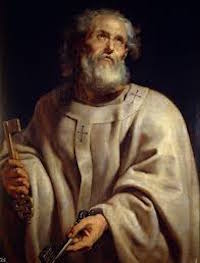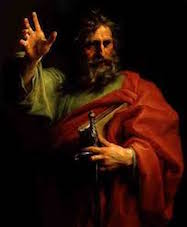 Patron of Fishermen and Watchmakers
Patron of Fishermen and WatchmakersSt. Peter was a fisherman of Galilee, named Simon, and the son of John. His brother Andrew introduced him to Christ about Whom they had heard from John the Baptist, and he became His disciple, ultimately giving up his family and possessions to follow Him. Christ changed his name to Peter (Rock) and made him the Rock on which His Church was to be built. After His Resurrection, Jesus conferred the primacy on Peter, who became the Vicar of Christ and the head of the Apostles, the first Pope.
The gospels speak about Peter more than any other Apostle. He was honored on many occasions; several miracles were performed for his benefit; Christ stayed at his home, preaching from his boat, sent him the first message of the resurrection, and appeared to him personally. Often Peter acted as spokesman for the other Apostles. Finally, mention is made of his defect: his anger, imperfect faith, impetuosity, and denial of Christ.
After the Ascension Peter began his work as head of the Church. He directed the election of Matthias, delivered the first public Apostolic sermon, cured a man lame from birth, and received a Divine commission to receive Gentiles into the Church. After the execution of James by Herod Agrippa, Peter was miraculously rescued from prison. He presided at the Apostolic council of Jerusalem in the year 50, when it was officially declared that the Gentile converts to the faith were not subject to the Jewish law of circumcision. Afterward, he went to Antioch, where it was decided that converted Jews were not bound to observe the Mosaic Law.
St. Peter dwelt in Rome intermittently for 25 years as founder and first Bishop of the Church there. Finally, in one of the last years of Nero’s reign, 64, he was crucified with his head down-ward, at his own request, not deeming himself worthy to die as did his Divine Master. Two Epistles of the New Testament are attributed to him, and the Gospel of St. Mark, who was his disciple, has been called “The Gospel of Peter”.
 St. Paul, the indefatigable Apostle of the Gentiles, was converted from Judaism on the road to Damascus.
St. Paul, the indefatigable Apostle of the Gentiles, was converted from Judaism on the road to Damascus.Paul remained some days in Damascus after his Baptism, and then went to Arabia, possibly for a year or two, to prepare himself for his future missionary activity. Having returned to Damascus, he stayed there for a time, preaching in the synagogues that Jesus is the Christ the Son of God. For this he incurred the hatred of the Jews and had to flee from the city. He then went to Jerusalem to see Peter and pay his homage to the head of the Church.
Later Paul went back to his native Tarsus and began to evangelize his own province until called by Barnabas to Antioch. After one year, on the occasion of famine, both Barnabas and Paul were sent with alms to the poor Christian community at Jerusalem. Having fulfilled their mission, they returned to Antioch.
Soon after this Paul and Barnabas made the first missionary journey (44/45-49/50), visiting the island of Cyprus, then Pamphylia, Pisidia, and Lycaonia, all in Asia Minor, and establishing Churches at Pisidian Antioch, Iconium, Lystra, and Derbe.
After the Apostolic Council of Jerusalem Paul, accompanied by Silas and later also Timothy and like, made his second missionary journey (50-52/53), first revisiting the Churches previously established by him in Asia Minor and then passing through Galatia. At Troas a vision of a Macedonian was had by Paul, which impressed him as a call from God to evangelize Macedonia. He accordingly sailed for Europe, and preached the Gospel in Philippi, Thessalonica, Beroea, Athens, and Corinth. Then he returned to Antioch by way of Ephesus and Jerusalem.
On his missionary journey (53/54-58) Paul visited nearly the same regions as on the second, but made Ephesus, where he remained nearly three years, the center of his missionary activity. He laid plans also for another missionary journey, intending to leave Jerusalem for Rome and Spain. But persecutions by the Jews hindered him from accomplishing his purpose. After two years of imprisonment at Caesarea he finally reached Rome, where he was kept another two years in chains.
The Acts of the Apostles gives us no further information on the life of this Apostle. We gather, however, from the Pastoral Epistles and from tradition that at the end of the two years St. Paul was traveled to Spain, later to the East again, and then back to Rome, where he was imprisoned a second time, and in the year 67 was beheaded.
St. Paul’s untiring interest in and paternal affection for the Churches established by him have given us fourteen canonical Epistles. It is, however, quite certain that he wrote other Letters that are no longer extant. In his Epistles, St. Paul shows himself to be a profound religious thinker, and he has had an enduring formative influence in the development of Christianity. The centuries only make more apparent his greatness of mind and spirit.
PRAYER: God, You give us a holy joy as we celebrate the solemnity of the Apostles Sts. Peter and Paul. Grant that Your Church may follow their teaching and example in all things, for it is through them that Christianity began its development. Amen.
